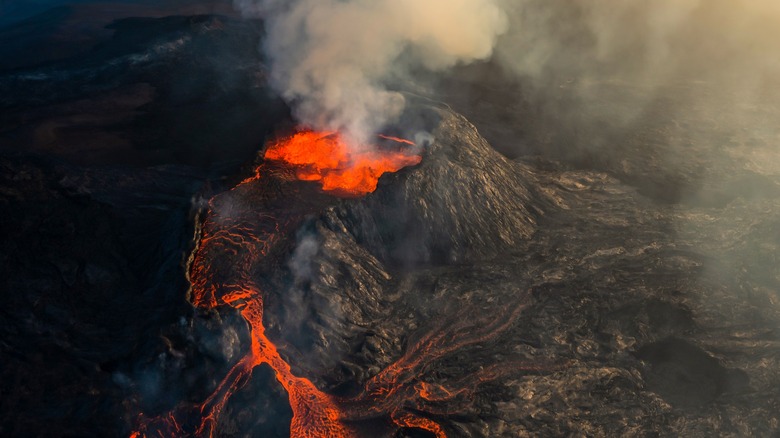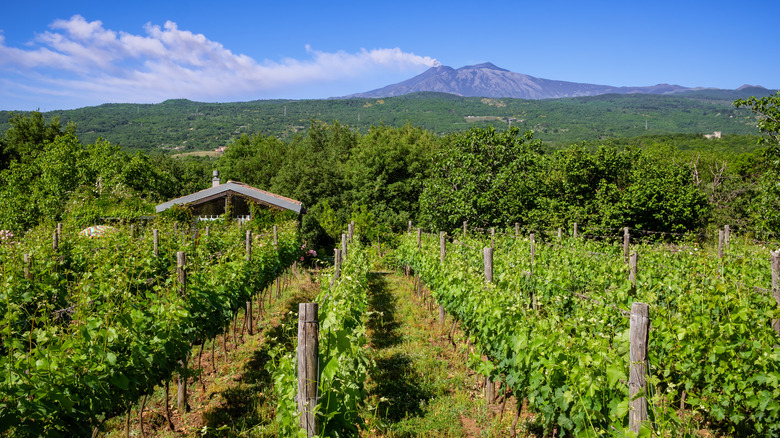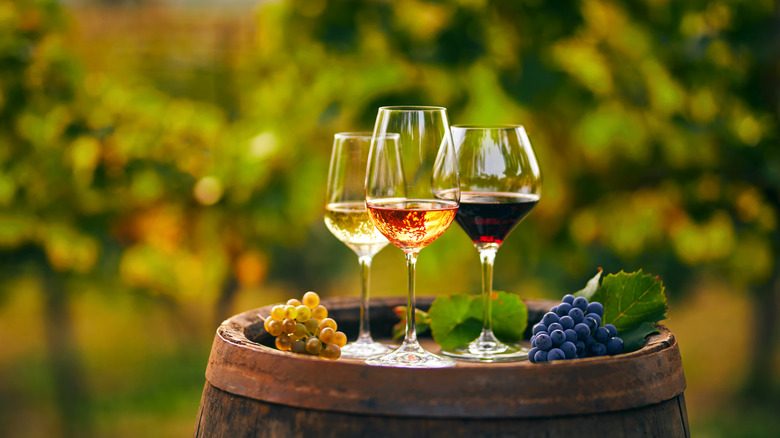The Secret Advantage That Volcanic Wineries Have
Wine will never go out of style. That being said, it's not immune to trends — whether it's sustainable wine, wine slushies, or the rosé craze. Buzzwords aside, wine enthusiasts appear to be imbibing more conscientiously than ever, investing in the stories behind the wines, how they're made, and where they come from.
Decanter reports that in 2022, wine drinkers are seeking out more natural wines and skin-contact wines — sounds risqué, but it actually has to do with how long the grape skins are kept on during the winemaking process, creating an orange wine (per Vine Pair). There's also more consumer interest in the welfare of viticultural workers, sustainability, and the supply chain, Decanter adds.
Another growing sector in the wine world is volcanic wines. Wait a minute — volcanic wines? When most people picture a vineyard, they might imagine a picturesque scene of sun-kissed grapes hanging on breeze-blown trellises, with a backdrop of rolling hill country in a pristine and peaceful place. A volcano seems like the last thing you want anywhere near your winery, when in fact the presence of temperamental, fire-breathing mountains results in very desirable wines.
Tasting notes of molten lava
According to National Geographic, people have been growing wine on volcanic soil for millennia. Today, you can find volcanic vineyards in Italy, Sicily, France, Spain, Portugal, Greece, Hungary, and Hawaii. Volcanic wineries offer unique settings with spectacular vistas to enjoy while you sip their singular wines, National Geographic adds. But why would you want to grow grapes by a volcano?
One might think the land would be barren — and that everything was obliterated by volcanic activity. The Canary Islands' vineyards are coated in black ash, according to Food & Wine. Plus, there's those pesky eruptions to contend with. Per Food & Wine, Italy's Mount Etna has blown its top four times just this past decade, and Hawaii's Volcano Winery is situated right on the edge of the Big Island's Volcanoes National Park, where the active Kilauea and Mauna Loa reside.
Sustainability Times adds that with global climate change, we may see even more volcanic shenanigans. But although volcanic soil isn't very fertile, it's loaded with minerals and drains well — and that creates small, acidic grapes that produce characteristic wines, according to Food & Wine.
Why drink volcanic wine?
If you enjoy wine, you'll love the unique character of wines grown in volcanic wineries. The New Gastronome describes a flinty earthiness imparted by iron, calcium, and other minerals in volcanic soil. The outlet also explains that the high pH of the wines means they last longer and taste fresher. Terroir is a key concept here — you can taste how the vineyard's location affects the final product. Volcanic wines are light and drinkable, pairing well with many foods and catering to the sophisticated tastes of modern wine lovers, The New Gastronome adds.
If you're intrigued by the exciting backstory and unique traits of volcanic wine, know that the cost of entry doesn't have to be high. Wine Enthusiast and Forbes list several Italian choices in the $20-30 range, and Forbes even mentions a few French bottles you can take home for under $10.
What pairs with volcanic wine? It depends on what type of wine, of course. But whether you're after classic pairings or something to elevate your dish, the subtlety of volcanic wines won't overpower your food, says The Growler.


